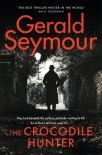The Crocodile Hunter by Gerald Seymour (english novels to improve english txt) 📗

- Author: Gerald Seymour
Book online «The Crocodile Hunter by Gerald Seymour (english novels to improve english txt) 📗». Author Gerald Seymour
“And the money?”
The phone light was shone into his face. But Cammy’s hand had already moved to the pocket at his hip, had taken the screwdriver and had slid its handle up his sleeve. Would he pay $24,000 for the privilege of putting to sea in the darkness in a craft that any reasonably well-off tourist would have rejected if charged more than $2,400, inclusive of the fuel and the engine? He would not. Would he bargain, haggle? He would not. Would he listen to the entreaties of the Iranians behind him – who did not understand the power of the sea running the width of the Channel – and who were strangely desperate to reach his country? He would not. The phone’s light would have caught his smile; it had none of the previous icy cold, seemed sincere. The Chechen would have made a life’s study of suspicion, employed it through most of his waking hours, and when he was with a whore there would have been a loaded pistol, within reach . . . The smile relaxed him and his boys dropped their guard, and Cammy went forward as if to look more closely at the inflated dinghy.
His smile had disappeared, and his teeth ground together and his lips thinned and the screwdriver was at the Chechen’s throat, and the other hand had the Chechen’s right arm tucked high behind his back, leaving him rocking with the pain. There, for all to see, was the screwdriver blade and the indentation in the skin behind the beard, and also the shock saturating the Chechen’s features. All still as statues for the moments it took for the Chechen to absorb his situation, and for his two boys to read it – and for the Iranians, the men and the women and the children, to appreciate it.
He gave crisp orders. The Chechen’s boys would have looked into the face of their father, what they could see of it, would have taken a signal from his expression, might also have noticed that he had wet the front of his jeans. The Iranians were Christians, refugees in flight, would have believed in cheek turning, in abstaining from violence. Would have seen that, in their name, a fleck of blood seeped into the beard of a man who would have robbed them of their wealth, and watched them drift away to their deaths. The father spoke, from the side of his mouth, and the boys backed away . . . if they had a weapon it would have been in the father’s belt. Cammy called to one of the Iranian kids, told him in clipped English what he should do, was understood. Hands poked around the man’s waist, and he shivered, which deepened the cut in his skin. A pistol was found. Not a PPK Walther but a Makarov PM – and a short-bladed knife. He told the kid to run and chuck them both. The school teacher and the psychologist were to lift the craft and the women between them would bring the outboard engine. The children were to bring the bags from their own vehicle.
Cammy led them through the dunes, between the swaying grasses. He told the Chechen that his sons were to stay at their pick-up and told him that if they intervened then they would have no father. His voice discouraged argument. Cammy kept the screwdriver against the Chechen’s throat, close to his windpipe.
They crossed the dunes and the long grasses, reached the soft sand beyond the tide’s reach. The waves made a drumbeat ahead of him. Much of his time in recent years he had shrugged when the odds stacked badly. Recalled the moments when he had hugged Ulrike or Pieter, Mikki or Tomas – or Dwayne, who used to say that what he dreaded most of all was the “claustrophobia of conformity” – and pushed on with them around him. Now he was alone and tailed by a gang who could barely help him. They crossed the wet sand, and the waves came forward in steady lines. He told the teacher and the psychologist to get the craft into the water and hold it, and told the women to fasten the engine into place . . . It rose and fell, water splashing over them, in their eyes and up their noses, and they were wading.
Cammy manoeuvred the Chechen in front of it, gave him an instruction. Took the screwdriver from his throat. Released the hand holding his arm.
They were up to their waists. Money was passed – $2,400. The kids were in the floor of the dinghy. The women clung to the sides, hitched their skirts and heaved their legs over. Then the men . . . The dinghy bucked and heaved and the waves broke around it, and someone screamed.
The outboard was started and the little propeller thrashed in the water and there was a moment between the waves breaking when it shifted the dinghy forward.
“You’ll be back,” the Chechen called. “Back here, washed up, drowned. It is certain.”
Cammy clung to the ropes at the side, drove the dinghy forward until his feet were no longer on the seabed, then pushed and swung himself aboard. The next wave tossed them and the engine raced when it was clear of the water, and they dropped, and they lost sight of the beach and the rigid white lines where the surf broke.
And, just for a moment, he stretched his neck, tilted his head as if





Comments (0)